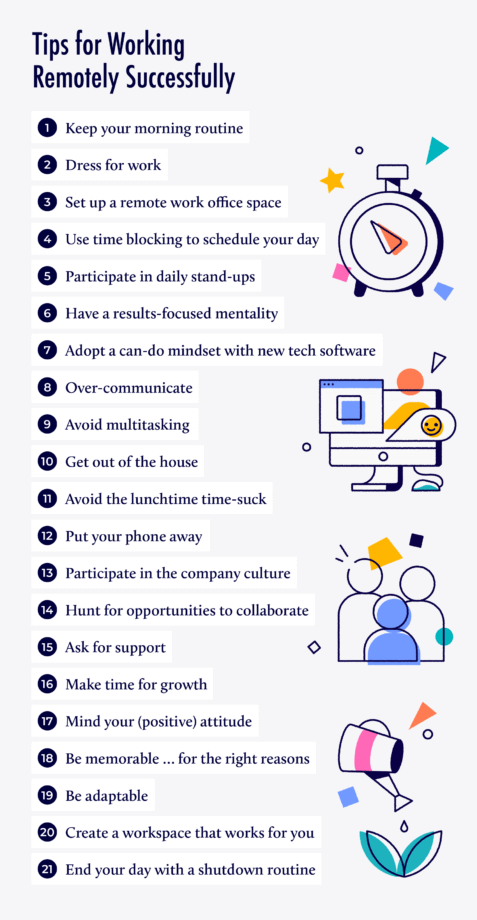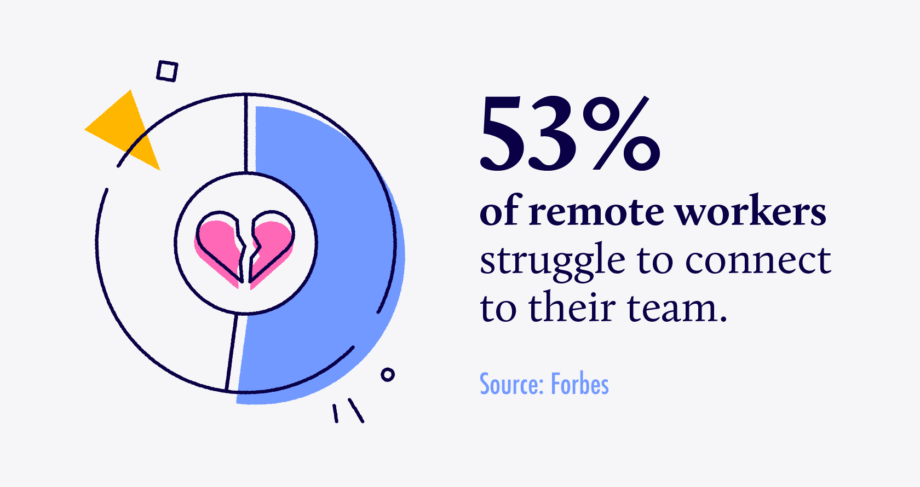In the wake of the COVID-19 pandemic, millions of people stepped into remote work for the first time.
My company has been remote for 10+ years, and during that time, I’ve discovered how to be productive and lead highly productive remote work teams.
I originally put these remote work tips together for the school where I serve on the board, but they quickly became requested by many other people I know.
This article is for those people brand new to remote work, and the remote work tips I share are designed to help you be as productive as possible.
Let’s dive in!
Key Takeaways
- Establish a routine that works for you and stick to it every day to create a sense of normalcy.
- Utilize tech and other tools that help you be more productive.
- Communicate well and often, and think about how you may be coming across in writing.
- Look for opportunities to connect. 53% of remote workers report struggling with connecting to their teammates.

1. Keep Your Morning Routine
The most counter-productive thing you can do when starting a remote role for the first time is to create a new morning routine.
The second most counter-productive thing you can do is change your existing morning routine.
As best you can, keep the status quo for your morning routine. You can only manage so much change at one time.
Wake up at the same time, get dressed like normal, make coffee and have your “me” time. Whatever “routine” looks like for you in the morning, be kind to yourself and keep it.
2. Dress For Work
Pajamas and sweatpants are fun until they aren’t. Don’t fool yourself into thinking the novelty of a new environment will inherently make you more productive.
You are brand new at remote work. You’ve not developed the discipline yet to wear whatever you would like and still be highly productive.
Dress for work as if you were going into your normal work environment. Fix your hair, do your makeup, tuck in your shirt and put on nice shoes.
You need the foundation of “normal” in order to find early success in remote work. Make your wardrobe your best visible reminder that you are ready to win the day.
3. Set Up a Remote Work Office Space
For those who enjoy working, this is important. For those who need more external motivation, this is even more important.
Take the time saved from your commute, along with whatever spare time you may find in your day, and dedicate a space to your remote work.
If you have an office, perfect. Turn it into your remote workspace. If not, use a low-traffic area of your home and transform it into your remote workspace.
Make this one of your first tasks, and once it is complete, communicate it clearly to whoever else is in your household. They need to respect this new space.
The more everyone feels like it is a real work environment (you included), the more likely you will be productive in it.
4. Use Time Blocking to Schedule Your Day
The new freedoms found with remote work can be paralyzing if you don’t manage them properly.
In your usual work environment, there are routines, norms and natural accountability to keep you focused.
In a remote work environment, none of these exist. It’s incredibly easy to say, “Wow, that table is dusty. I should really dust it!” and then stand in shock when an hour has passed by.
I don’t think I can overstate how critical time blocking is if you want to be productive in a remote work environment. I’ve even written an article about daily time blocking that will help you get started.
Discipline is your friend. Make fast friends with it through time blocking.
5. Participate in Daily Stand-Ups
What is a daily stand-up? It’s a quick summary of how you are feeling, what you are working on for the day and the obstacles you are facing to get your work done. Daily stand-ups take many formats, but if you have not done it before, simply answer these four questions and send the responses to your supervisor/manager/boss:
- How do you feel today? This lets those in charge know how you are feeling (happy, sad, anxious, worried, sick, excited, etc.). It’s a quick way to let people know your mental and emotional well-being at the beginning of the day.
- What did you do yesterday? Give a quick recap of the work you completed yesterday. You don’t have to go into great detail. Just give the brief highlights and ensure nothing noteworthy is left out.
- What will you do today? This lets those in charge know what to expect of you. Setting appropriate expectations is important, so be as detailed as you can, and do your best to meet those expectations. Confidence and trust in you as a person grows when you say what you are going to do … and then do it.
- Is there anything blocking your progress? Sometimes, work can’t happen because a roadblock exists. Communicate that clearly at the start of your day. If your internet is being difficult, let people know. Do you have a kid who is homesick? Let people know. Again, setting appropriate expectations goes a long way for you to be successful and productive in working remotely.
Trust me when I say that your superior will gain a newfound respect for you if you do this. Plus, if you’ve said you are going to do something publicly, you are more likely to do it (consistency + commitment tendency).
It’s natural accountability, and you need it as you step into remote work for the first time.
6. Have a Results Focused Mentality
You should be results-oriented regardless, but it is especially important in a remote work environment.
Why? Nobody sees you checking tasks off your list, and to be perfectly honest, your boss won’t have the time to care.
I don’t say that to be mean — it’s just the honest truth. What they will care about, however, are the results you produce.
Let me give you a quick example:
- Task-oriented: Today, I finished my lesson plans for the rest of the week.
- Result-oriented: Today, 93% of my students turned in their assignments on time.
Let me also give a quick word of caution for those who are now discovering they are task-oriented: there is nowhere to hide in remote work.
It’s a wake-up call to focus on doing the right things, not doing all the things right.
7. Adopt a Can-Do Mindset With New Tech Software
Most of you are going to be using brand-new technology and software. That can be scary.
But it will only be scary if you let it be scary.
If you want technology to be hard, it will be hard. Tell yourself technology is easy, and when it doesn’t work the way you want it to, blame the people who made it and find the hack to make it work!
I know this sounds so silly, but the subtle change in association is powerful. Instead of putting the blame on yourself for being tech-illiterate, you put the blame on the software creators for not understanding you well enough.
And when you think that way, figuring out new tech becomes a game, not a chore. Because when you get it working right, despite their best efforts, you win!
P.S. I create, sell and support tech software for a living. Sometimes, turning it on and off really does work.
8. Over-Communicate
Effective communication is the lifeblood of remote work. When you think you’ve communicated enough, you haven’t. Over-communicate, and then communicate more.
9. Avoid Multitasking
Now, this is true for any work environment, but it is especially important for working remotely.
Multitasking actually makes you less productive, as it divides your focus and makes tasks take longer than they would with your full attention.
Avoid doing multiple things at once. If you’re going to step away to do some laundry, run an errand or tend to a sick child, set yourself a timer for how long you can step away before you need to get back to work.
And when you get back to work, give it your full attention.
In an ideal world, you would only focus on work tasks during working hours, but with working from home, that’s not always possible. It’s one of the major benefits of remote work, but it can also be a major drawback if you lack self-discipline.
10. Get Out of the House
While the biggest advantage of remote work is not having to leave your house, it can also be a major disadvantage.
Whether you go work in a coffee shop, test out a co-working space or just take a break to go for a walk or grab a coffee, it’s good to get away from your workspace.
Not only is it good for productivity to take frequent breaks, but it’s also good for your mental health.
(And let’s not forget the 20-20-20 rule for preventing eye fatigue, where for every 20 minutes of screen time, you should look at something 20 feet away for 20 seconds.)
11. Avoid the Lunchtime Time-Suck
Plan or meal prep at least half of your lunches for the week ahead to avoid eating up your valuable time (pun intended).
Having a meal ready to go when you hit a natural break in your day streamlines your workflow, so you don’t have to stop for an extended period to get or prepare your food..
12. Put Your Phone Away
Your phone is a distraction. Put it away!
I use Do Not Disturb (DND) on my iPhone to make sure I’m only receiving the most important messages, calls and notifications throughout the day. Otherwise, they can wait until work is done.
Your role or other responsibilities may not allow you to be completely inaccessible, but even just committing to heads-down time by not checking your phone for a specific period of time improves remote productivity.

13. Participate in the Company Culture
Many remote workers struggle with feeling like they’re not a part of a team.
And as much as 53% of remote workers struggle to connect with their coworkers.
Where possible and appropriate, participate in social channels, Lunch and Learns, clubs that interest you, and build time in your schedule to socialize.
And if your workplace doesn’t offer any social outlets, start one yourself! Many organizations that went remote during the pandemic are still working out how to create a thriving remote culture, and you’ve got a prime opportunity to become a culture shaper and carrier.
14. Hunt for Opportunities to Collaborate
Another great way to connect with co-workers on remote teams is to look for opportunities for productive collaboration.
Your role itself may play a part in how much this is possible (as some roles will naturally lend themselves to more collaboration than others).
However, even for jobs that are primarily done independently, you can still create points of collaboration throughout your workday.
Check-in with a coworker to see how they’re doing on a project. Share an interesting article you read that’s relevant to your work. Ask for feedback on how you chose to handle a new task.
Even the chance to quickly connect with your coworkers on a human level can add great value to your remote work experience.
15. Ask for Support
Struggling with working remotely for the first time? Take a dose of humility and ask for help!
Whether that means that you need help with certain tasks, to shift some responsibilities around or are just hoping for some project management advice, most teammates want to help.
And the quicker you bring up your issues, the less likely they are to impact your performance.
16. Make Time for Growth
In any work environment, but especially in a remote work environment, setting aside time for learning and development is important.
Many workplaces have a budget dedicated to continuing education, so you can go to seminars or conferences, attend classes, read books – all on the company dime!
If you aren’t sure how to spur yourself to professional growth, check out my individual development plan. It’s a fantastic resource that brings clarity to your aspirations and confidence in your ability to achieve them.
17. Mind Your (Positive) Attitude
I like to keep this thought top of mind: it’s not about how hard you work — it’s about your attitude while working.
The power of positivity is real.
People who excel in remote work environments are not only good at managing their time but also express a highly positive attitude about their work.
18. Be Memorable … for the Right Reasons
Working remotely can mean that face time with your team is limited. That’s why it’s important to be memorable (but for the right reasons)!
Keep your camera on during team meetings. Be friendly. Go the extra mile to help your coworkers. Remember the Golden Rule and be the person you want others to be to you.
19. Be Adaptable
As you settle into remote work, remember that the nature of remote work means you need to be highly adaptable.
A sick kid stays at home. A noisy contractor remodels a bathroom. The loud drone of leaf blowers engulf the neighborhood.
Don’t be rigid! Experiment with your routines and discover the 20% of your routines that contribute 80% of your productivity…then be flexible and adaptable with the rest.
Adaptability builds resilience, and resilience is necessary to thrive in remote work environments.
20. Create a Workspace That Works for You
Assuming you’ve established a dedicated remote workspace, you should also create a home office that’s ideal for you.
Just like you would your office at work, personalize your office workspace at home. Hang up some inspiring art. Decorate your desk with pictures of your family or silly chachkies that bring subtle smiles to your face.
The more effort you put into creating a haven in your home office, the more likely you are to be productive and effective in it.
21. End Your Day With a Shutdown Routine
This is my final remote work tip, and it’s the one that is most often neglected.
You absolutely need to allot 15-30 minutes at the end of your working day to shut down. Otherwise, remote work will bleed into your regular life, and it will quickly become a destructive habit.
I know this because I’ve been there, and it wreaks havoc on your closest relationships.
Schedule out a 15 or 30-minute time block to transition out of work mode. I like to turn on classical piano and read a book. You may want to have a different routine, like meditating, writing in a journal or praying.
The contents of the routine don’t matter as much as establishing the routine itself.
Don’t brush this off as a nice-to-have wishlist item! This needs to be a part of your day, and you need to make it a priority.
Do What Works For You
There are many other things that I could have shared, but I didn’t list the kitchen sink of remote work tips because I wanted to keep the important ones important.
Remote work is great. I love it, and I can’t imagine life another way. But, with great freedom and flexibility comes great responsibility.
Be disciplined, follow these remote work tips, and you will discover a more productive you!
If you’ve found these remote work tips helpful, please share them with others. It’s a simple way for you to pay it forward for the value you’ve received! You can do so by clicking on the share buttons associated with this article.
Until next time,
Thomas







I agree that having a work space is very important. Not sure about over communicating though. Yes, communication is important, but to be honest, I find all those online meetings that happen just because your manager thinks they should happen pretty useless. Sometimes they’re a waste of time, in my opinion. If everyone in the team knows what to do and how to do it, I think it’s a better idea to just let them do it. What I think is super useful when working remotely is using tools. My team uses kanbantool.com, we like it a lot. We can see clearly who is working on which task and where we are with the project, it makes work a lot easier and smoother.
Over-communicating doesn’t necessarily mean more meetings! I agree that less meetings is better. Over-communicating is mostly about clear and concise writing. Writing is an excellent forcing function to get clarity for yourself and from others, and using tools that enforce better written communication are always a huge win. 🙂